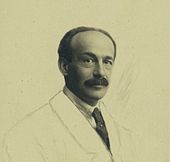Berthold Feiwel
Berthold Feiwel (born August 15, 1875 in Pohrlitz , Moravia , † December 29, 1937 in Jerusalem ) was an Austro-Jewish writer, translator, publicist and Zionist politician.

Life
Berthold Feiwel, son of Josef and Charlotte (née Schnabel) Feiwel, attended schools in Brno and studied law and economics at the universities of Vienna and Zurich from 1893 to 1897 .
In 1897 he took part in the preparatory work for the First Zionist Congress and was then also a delegate. Together with Robert Stricker and Max Hickel, he founded the Jüdische Volksstimme in Brno and was its editor-in-chief. It was there that he established the Veritas Jewish-Academic Association .
Called to Vienna by Theodor Herzl , he was editor-in-chief and publisher of the Zionist central organ Die Welt (Jan. 1900 to approx. Aug. 1901). Feiwel had been a member of the Grand Committee of Action since the Fourth Congress as well as a co-founder and one of the spokesmen for the Democratic Group at the Fifth and Sixth Congresses. Feiwel was one of the founders of the Jewish publishing house in Berlin and was its director from 1902-07. In the conflict between Western and Eastern Judaism , as a Western Jew, he found a great deal of understanding and interest in Eastern Jewish culture and translated poems by Morris Rosenfeld . He published the Jewish Almanach , the Junge Harfe and, in Cologne, the magazine Jung Israel . In collaboration with Martin Buber and Chaim Weizmann , the plan to found the Hebrew University of Jerusalem came about .
After the First World War, Feiwel went to London and got involved in the Zionist cause. 1920–1926 he was director of the newly founded Keren Hajessod in London and from 1929 head of the Jewish Colonial Trust. From 1933 he lived in Palestine.
The Wiener Morgenzeitung paid tribute to Feiwel on the occasion of his 50th birthday: “A humble man who always only keeps an eye on the matter to which he dedicates his life's work, he himself has always diverted the attention of the Zionist public from his personal share in the Zionist successes. "
Quote
Federal song of the Jewish-academic holiday association Achiwah , Hungarian Hradisch .
- Wake up, you sleepers in the dead of night!
The boy's footsteps roar,
It waves and roars like storm and battle;
The people of the Jews are awakened
and calling for their sons.
- The day flames. Gone the night!
They come, my people, save you,
your arm is powerful, your eye is laughing,
courage is your weapon and pride is your dress.
The chains are broken,
- No longer cover yourself, Zion in night!
And the enemies throw you down,
And the royal splendor turned into ruins.
We build you up with strong power
And build you more beautifully again.
- Wake up, you sleepers in the dead of night!
...
literature
- Susanne Blumesberger, Michael Doppelhofer, Gabriele Mauthe: Handbook of Austrian authors of Jewish origin from the 18th to the 20th century . Volume 1: A-I. Edited by the Austrian National Library. Saur, Munich 2002, ISBN 3-598-11545-8 , pp. 307f.
- Feiwel, Berthold. In: Lexicon of German-Jewish Authors . Volume 7: Feis – Frey. Edited by the Bibliographia Judaica archive. Saur, Munich 1999, ISBN 3-598-22687-X , pp. 18-23.
- Salomon Wininger : Great Jewish National Biography . Volume 2. Chernivtsi 1927, p. 231f.
Web links
- Literature by and about Berthold Feiwel in the catalog of the German National Library
- Literature by and about Berthold Feiwel in the bibliographic database WorldCat
- Literature by and about Berthold Feiwel in JCSenckenberg University Library Frankfurt / M. Digital Collections Judaica
Individual evidence
- ^ Lionel Gossman: Art Nouveau in Firestone: The Jewish Illustrator EM Lilien (1874-1925). , last page
- ^ Editions digitized by the Austrian National Library : Berthold Feiwel (online at ANNO ).
- ↑ Harald Seewann : Circle and Zion Star. Volume 1. Graz 1990, p. 186.
- ↑ Dr. Bertold Feiwel fifty years old . In: Wiener Morgenzeitung , September 18, 1925, p. 4.
- ↑ Berthold Feiwel, quoted from Salomon Wininger : Große Jüdische National-Biographie . Volume 2. Chernivtsi 1927, p. 232
| personal data | |
|---|---|
| SURNAME | Feiwel, Berthold |
| BRIEF DESCRIPTION | Zionist politician |
| DATE OF BIRTH | August 15, 1875 |
| PLACE OF BIRTH | Pohořelice |
| DATE OF DEATH | December 29, 1937 |
| Place of death | Jerusalem |

